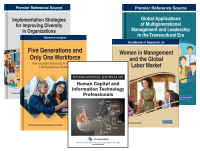In the current dialogue of diversity, equity, and inclusion, one of the important components that is affecting nearly every industry and business globally is that the overall workforce is now being comprised of five generations. According to a recent
Forbes article, this multi-generational workforce is offering benefits to organizations, as their employees have a diverse range of experience, skills, and solutions. However, it can also cause ongoing challenges in ensuring that their staff’s needs are met, implement new programs and tools, as well as have them work and collaborate effectively. This includes specific preferences and motivations for each generation, including:
- Generation Z (Born 1997-2012): Growing up with technology, this generation values active engagement at work, flexible work hours, high collaboration, and professional growth.
- Millennials (Born 1981-1996): Experiencing multiple recessions and the transformation of the internet, this generation values career development programs, remote working, work-life balance, and measure success based on results rather than
hours worked. - Generation X (Born 1965-1980): Living through the evolution of personal computers, this generation values a work environment focused on individual effort, greater autonomy, less supervision, and a work-life balance, as many
have families. - Baby Boomers (Born after World War II): This generation is more goal-centric and often has a wealth of industry knowledge that they enjoy sharing with younger colleagues. They value a more structured environment, recognition for achievements through awards, benefits, and face-to-face communication.
- Traditionalists (Born 1925-1945): According to Purdue Global University, they make up 2% of the workforce in the United States alone, and value stability, personal recognition, and providing long-term value to a company.
Understanding these trends will continue to progress over the years, Prof. Paula McIver Nottingham, from Middlesex University, UK, explains in their chapter, “
Designing Work-Based Learning Approaches for Gen Y, Gen Z, and Beyond” featured in
Applications of Work Integrated Learning Among Gen Z and Y Students how academic institutions and businesses can collaborate to create work-integrated learning and adjust to these generational differences.
| View a Preview of the Open Access Article Below |
|
Work-based learning in the United Kingdom (UK) is seen as a way to provide academic and experiential learning for individuals and cohorts who are based in the workplace for short periods of time or employed within established roles. The more specific aim of work-integrated learning is to provide a connectedness between academic and workplace learning (Lester & Bravenboer, 2016). Degree apprenticeships are work-integrated programmes of study that present disciplinary and occupational knowledge, skills, behaviours and values that can be applied to sector specific job roles. Recently, there has been an expansion of degree apprenticeships in the UK that support government policies for delivering sector skills and social mobility (Crawford-Lee & Moorwood, 2019).
This chapter explores how work-based pedagogies can be used to address the challenges of planning degree apprenticeships for current and new generations of learners, Generation Y (Gen Y) and Generation Z (Gen Z) and provides a case study of the BSc (Hons) Professional Practice in Business to Business Sales (B2B Sales) Degree Apprenticeship, located in the Business School at Middlesex University. The degree apprenticeship was developed for establishing business to business salespeople in large and small businesses throughout the UK. This programme is a collaborative partnership with a Consalia Ltd. (2020) that provides specialist sales education. Consalia is affiliated with the Association of Professional Sales (APS, 2020), the professional body connected to the apprenticeship, and has been a strong supporter of the campaign to professionalise sales in the UK.
There is a continuing need to redefine work-based and work-integrated learning to build on the legacy of practice and to innovate the pedagogy for younger cohorts. Middlesex University has been a leader in practice-based and work-based learning for many years but has increased its engagement with hybrid pedagogic concepts for degree apprenticeships (Nottingham, 2017). Revitalising work-based pedagogy at this University seeks to address the guiding principles for apprenticeships to deliver relevant learning outcomes for the workplace (QAA, 2018). Degree apprenticeships contain assessments relevant to attainment for sector qualification frameworks outside of the academy, generic and lifelong learning principles (Nottingham, 2019) sustain broader higher educational goals. Working with work-based students means considering separate sites of learning and application of learning within the rapidly changing context of the workplace. This is a somewhat different proposition than determining what learning and teaching strategies that work well for students in a purely campus-based experience.
Trends for Understanding Current Higher Education Practice
The field of work-based and work-integrated learning is a varied one for universities and educators, and generally comes into focus when government policies endorse the expansion of skills and economic growth tied to the needs of industry. Apprenticeships are the latest policy initiative in the UK to support work-integrated learning (Richard, 2012; BIS, 2013; Powel, 2020). Work-based studies apply experiential learning cycles within organisational settings, and generally include independent research as a capstone project (equivalent to a dissertation) for degree work. The curriculum design allows academic practitioners to develop practice-based units of study that promote learning from experience underpinned by reflection on practice that acts as a catalyst for change (Helyer, 2015).
The pedagogy associated with work-based learning in the UK became more prominent in the early 1990s as there was an increased need to develop higher education courses that responded to national and international adult and lifelong learning policies (Little & Brennan,1996). Traditional practice- based areas of higher education such as education, health (nursing and allied professions) and engineering adapted a work-based learning pedagogy to include the greater use of the workplace setting. Policies for widening participation and world class skills (Leitch, 2006) led to a more expansive vision for providing vocationally oriented higher educational experiences to those based in the workplace.
Degree apprenticeships combine higher education with professionally recognised qualifications in a particular occupation and with the provision of 20% off-the-job training (DfE, 2019) which equates to approximately one study day a week for around forty-five weeks a year. Taking part in work-based learning while in employment allows students to demonstrate, with formative employer feedback, the knowledge, skills, behaviours and values from a validated degree programme and gain national professional qualifications. Apprenticeship standards assess apprentices on disciplinary/occupational knowledge and professional competences (Bravenboer & Lester, 2016). A classic feature of this type of work-based provision is the tripartite which consists of the employer, apprentices, and university as all three are involved in the negotiated tuition/learning for the programme.
Symes and McIntyre (2000) used the term ‘working knowledge’ as a way to distinguish the acquisition of knowledge that had more practical learning goals than one solely associated with theoretical knowledge. Work-based pathways act to enable a greater use of Mode 2 (knowledge external to the university), socially distributed knowledge that moves beyond codified disciplines (Nowotny et al., 2001) to engage with knowledge in real-world settings. These situated settings require an approach to learning that recognises reflexivity as the positioning of ‘self’ in research and expresses the many varied ways that knowledge is created and used (Fook & Gardner, 2007). Transdisciplinary approaches to work-based learning inform the basis for conducting research that examines complex problems as an insider-researcher within real-world settings (Lester & Costley, 2010; Costley et al., 2010). Work-based approaches (Bravenboer & Lester, 2016) and work-integrated approaches for early careers (Oliver, 2015) are now integral to degree apprenticeship provision.
 | Order Five Titles in a Related Subject Area
& Receive a
20% Discount through
IGI Global’s Online Bookstore. Learn > |
|
|
Considerations for higher education flexibility (Barnett, 2014; Nottingham, 2016) makes work-based pedagogy useful to applied professional studies in many academic disciplines where content is being presented and where individuals are in a defined workplace role. The focus on the actual practice in the workplace has the potential to develop broader business concepts such as leadership (Gerhardt, 2018) which could be important to younger generations. Wall (2017) speaks to the need to research work-based learning in light of the current political climate as a way of investing in inclusive and sustainable higher education practice. The flexibility and responsiveness of the degree apprenticeship is increasingly being used by businesses to inform strategic organisational aims for the future workforce (CIPD, 2015).
Complimentary Research Articles and Chapters on
Multi-Generational Workforces and Diversity in Business | | | | | | | | | Five Generations and Only One Workforce | Mehdi Khosrow-Pour, D.B.A.
©2020 | 364 pgs. | EISBN: 9781799804390 | - Indexed in Scopus
- Hand-Selected Content From Expert Editorial Team
- Covers Aging Workforce, Generation Gap, & Millennial Workers
|
|
| |
| |
|
| | | | | View All Chapters and Articles on This Topic | | The “View All Chapters and Articles on This Topic” navigates to IGI Global’s Demo Account, which provides a sample of the IGI Global content available through IGI Global’s e-Book Collection (6,600+ e-books) and e-Journal Collection (140+ e-journals) databases. If interested in having full access to this peer-reviewed research content,
Recommend These Valuable Research Tools to Your Library |
| IGI Global Continually Supports Diversity, Equality & Inclusivity (DEI)
Our goal is to continue to demonstrate a diverse, inclusive culture that fuels innovation among the communities we serve. | 350+
Titles on Diversity
& Inclusivity |
|
| 100,000+ Authors
from 100+ Countries |
|
| Global
Team
& Subsidiary
China Office |
|
| All Titles Contain Diverse
Perspectives |
|
|
| | Download DEI Title List |
|
|
|

For Journalists Interested in Additional Trending Research
Contact IGI Global’s Marketing Team at marketing@igi-global.com or 717-533-8845 ext. 100 to access additional peer-reviewed resources to integrate into your latest news stories.
About IGI Global
Founded in 1988, IGI Global, an international academic publisher, is committed to producing the highest quality research (as an active full member of the Committee on Publication Ethics “COPE”) and ensuring the timely dissemination of innovative research findings through an expeditious and technologically advanced publishing process. Through their commitment to supporting the research community ahead of profitability, and taking a chance on virtually untapped topic coverage, IGI Global has been able to collaborate with over 100,000+ researchers from some of the most prominent research institutions around the world to publish the most emerging, peer-reviewed research across 350+ topics in 11 subject areas including business, computer science, education, engineering, social sciences, and more. To learn more about IGI Global, click here.
Newsroom Contact
Caroline Campbell
Assistant Director of Marketing and Sales
(717) 533-8845, ext. 144
ccampbell@igi-global.com
www.igi-global.com